.
Publications
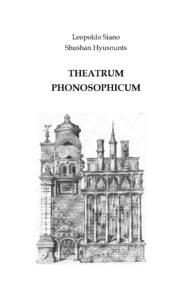
Theatrum Phonosophicum (a manifesto)
This small book is a kind of poetic manifesto of the theatrum phonosophicum.
A limited edition in 101 copies, numbered and signed by hand.
Published in December 2023, Naples (in Italian language).
For informations write to phonosophianova@gmail.com or theatrumphonosophicum@gmail.com
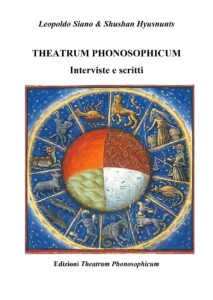
Theatrum Phonosophicum. Interviste e scritti
Theatrum Phonosophicum. Interviews and writings (in Italian language).
This volume collects interviews and writings, in particular on the activities of the theatrum phonosophicum in Armenia between 2022 and 2023.
A limited edition in 101 copies, numbered and signed by hand.
Published in December 2023, Naples
For informations write to phonosophianova@gmail.com or theatrumphonosophicum@gmail.com
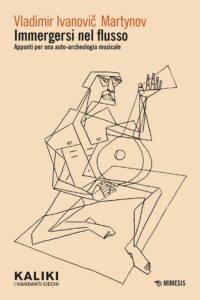
Vladimir Ivanovič Martynov, “Immergersi nel flusso”
A collection of writings of one of the major Russian composers and thinkers of the last decades, Vladimir Martynov, for the first time presented in Italian language. These texts offer an insight into the original thinking of this versatile artist.
Edited by Shushan Hyusnunts
Published by Mimesis Edizioni, in the series Kaliki, Milano 2023.
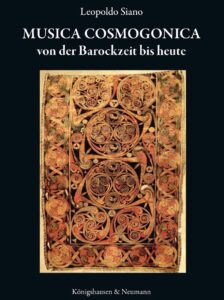
Musica Cosmogonica
En archē ēn ho Logos: “In the beginning was the Word”. This is the traditional translation of the Incipit of the Gospel of John. In Goethe’s “Faust” (Part I, Study Room), other possible interpretations of the term “logos” are suggested: “meaning”, “power”, “action”. The sentence could also be translated as: “In the beginning was the Sound”. Sound plays a decisive role in many creation myths of different cultures. Poets, philosophers, theologians, scientists, artists of all kinds and, last but not least, musicians have always been concerned with the question of the origin of the world. From the perspective of a composer, the question is: What does the beginning of the world sound like?
This book is a journey through the history of Western music from a cosmogonic point of view. On the basis of works composed between the 18th and the 21st century, it is shown how the cosmos sounds. By means of works written between the 18th and 21st centuries, it is shown with which musical means various composers (from Jean-Féry Rebel to Joseph Haydn, from Gustav Mahler to Charles Ives, from Richard Wagner to Karlheinz Stockhausen, etc.) have attempted to evoke the creation of the world, and which sonic archetypes they have drawn upon in order to acoustically represent the beginning of all things.
Published by Königshausen & Neuman: Würzburg 2021
https://verlag.koenigshausen-neumann.de/product/9783826070167-musica-cosmogonica/
https://www.youtube.com/watch?v=fpDwWC16gKY
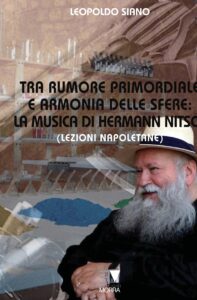
Tra rumore primordiale e armonie delle sfere: La musica di Hermann Nitsch
Between primordial noise and the harmony of the spheres. The music of Hermann Nitsch.
Published by Edizioni Morra, Naples 2018.
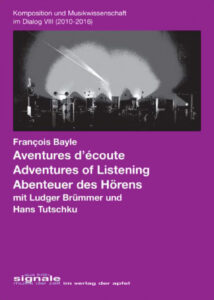
François Bayle, “The Adventure of Listening”
François Bayle, Die Abenteuer des Hörens / The advendture of listening / Lʼaventure de lʼécoute, edited by Leopoldo Siano with Christoph von Blumröder.
Published by: Der Apfel, Vienna 2020.
https://verlagderapfel.at/neuerscheinungen/index.php/produkt/francois-bayle-aventures-decoute-adventures-of-listening-abenteuer-des-hoerens/
http://www.magison.org/publications.html
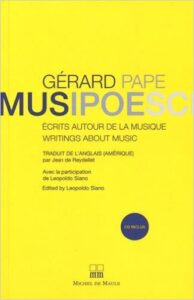
Gerard Pape, “Musipoesci”
Gerard Pape, MusiPoeSci. Écrits autour de la musique, with partecipation od Leopoldo Siano / MusiPoeSci. Writings about music, edited by Leopoldo Siano, Éditions Michel de Maule: Paris 2014. Languages: English, French
What is MusiPoeSci? The composer, Gerard Pape, finds that the composer cannot pretend to be a scientist, but that, like Varese, he can find inspiration in the sciences for his musical poetry on the condition that he is not fooled by such notions as “scientific progress” or that he takes technological advances as his main goal. In this book, we find an interview with Pape, fifteen of his texts and four analyses of his music. MUSIPOESCI plunges us into the unique and original universe of this iconoclastic composer.
https://www.micheldemaule.com/fr/livres-parus/Musipoesci/397.htm
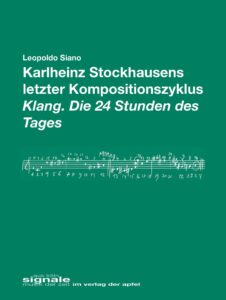
Karlheinz Stockhausen’s last composition cycle “Klang. Die 24 Stunden des Tages”
After the opera heptalogy “LIGHT. The 7 days of the week” (1977-2003) Karlheinz Stockhausen began the cycle of the 24 hours of the day: KLANG (“Sound”). Nevertheless, before his death on 5th December 2007, he wasn’t able to finish it. Sketches for KLANG and other documents, which are published comprehensively here for the first time, show how the premonition of death has been crucial for the chosen compositional strategies. In this book, the cycle KLANG becomes the starting point for a philosophical examination of Stockhausen’s entire oeuvre and musical poetics. The “Case of Stockhausen” is considered phenomenologically as an “event” of Western cultural history
The book (in German language) has been written as a PhD thesis at a University of Cologne. It is a winner of the prestigious Offermann-Hergarten Award.
Published in Vienna, Der Apfel 2013.
